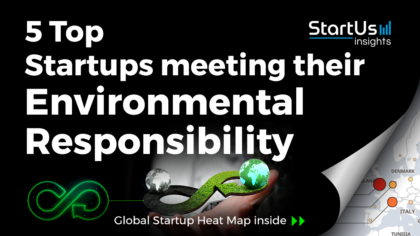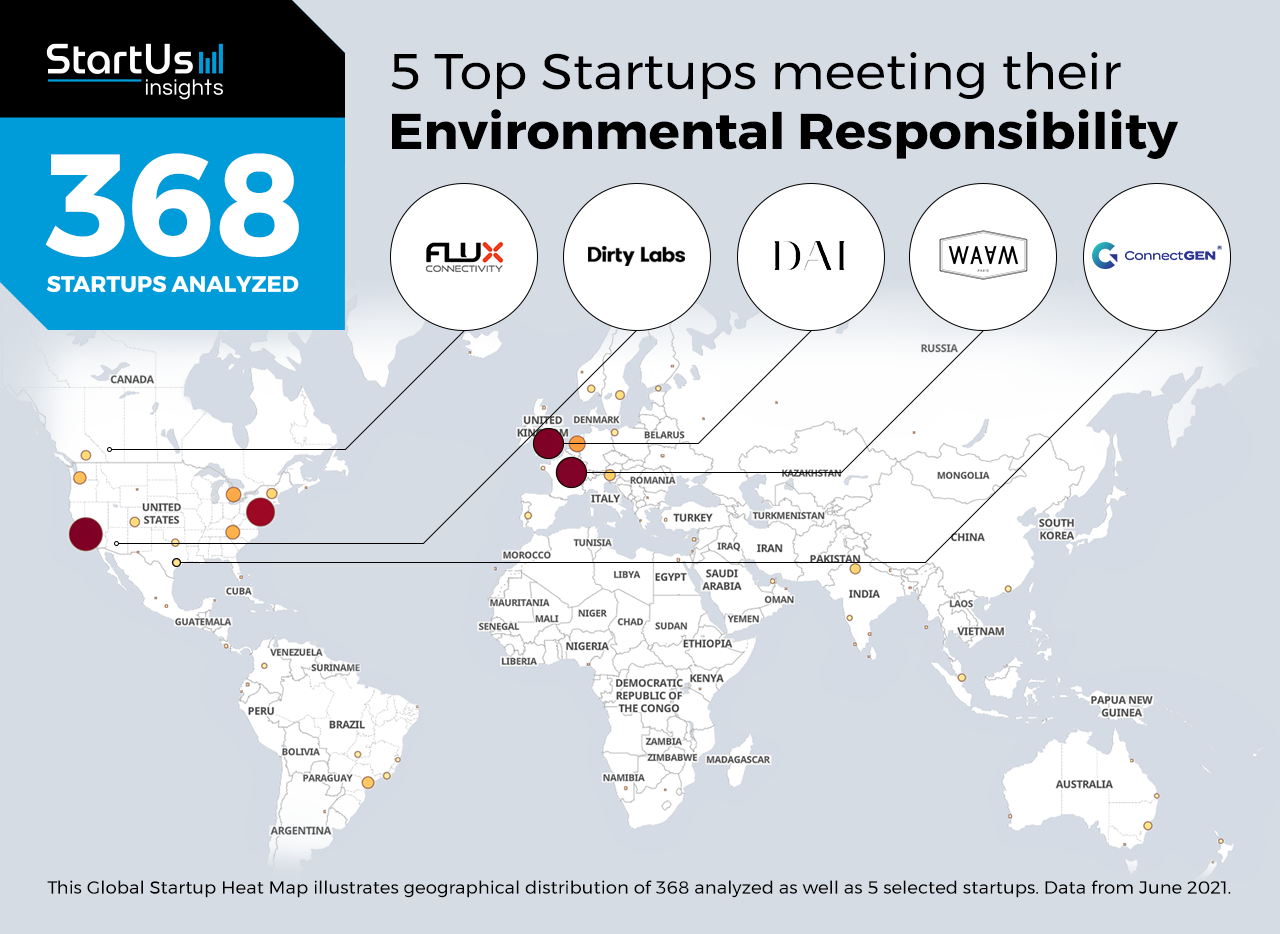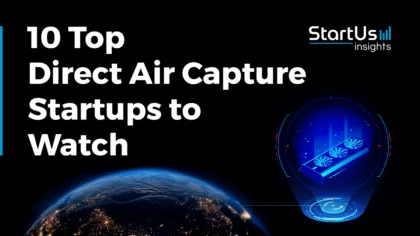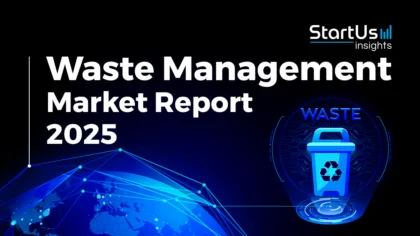Accelerate Productivity in 2025
Reignite Growth Despite the Global Slowdown
Staying ahead of the technology curve means strengthening your competitive advantage. That is why we give you data-driven innovation insights into the Circular Economy & sustainability. This time, you get to discover 5 hand-picked startups meeting their environmental responsibility.
Global Startup Heat Map highlights 5 Top Startups meeting their Environmental Responsibility out of 368
The insights of this data-driven analysis are derived from the Big Data & Artificial Intelligence-powered StartUs Insights Discovery Platform, covering 2.093.000+ startups & scaleups globally. The platform gives you an exhaustive overview of emerging technologies & relevant startups within a specific field in just a few clicks.
The Global Startup Heat Map below reveals the distribution of the 368 exemplary startups & scaleups we analyzed for this research. Further, it highlights 5 startups that we hand-picked based on criteria such as founding year, location, funding raised, and more. You get to explore the solutions of these 5 startups & scaleups in this report. For insights on the other 363 startups meeting their environmental responsibility, get in touch.
WAAM uses Recyclable Packaging for its Personal Care Products
The majority of personal care products such as shampoos and lotions come in single-use plastic bottles. This contributes to the already concerning amount of plastic pollution. To tackle this issue, startups are implementing recyclable materials for their packaging. For example, utilizing polyethylene terephthalate (PET), which is recyclable plastic, can be reused over and over again without quality loss. This way, companies are promoting the circular economy.
French startup WAAM primarily uses recyclable packaging for its personal care products as a part of the company’s corporate environmental responsibility. WAAM uses recyclable food-grade PET and rPET (recycled PET) for the bottles and jars in which their products are packed. The booklets that come with the personal care products use papers that are 100% certified by the PEFC (Program for the Endorsement of Forest Certification). Even for its business cards, WAAM uses cotton paper made out of recycled T-shirts and textile scraps, and ink made from vegetables. Additionally, these materials are sourced in Europe, further reducing their carbon footprint.
Dirty Labs produces an Eco-Friendly Laundry Detergent
Laundry detergents and other cleaning products usually contain harmful chemicals that deplete oxygen in waterways, thus endangering aquatic life. To solve this issue, startups that are producing cleaning products are switching to bio-based ingredients. For instance, they use biosynthesis — a bio-renewable fermentation process that uses natural microbes in a nutrient-rich broth to create enzymes. This way, biosynthesis produces ingredients that are non-toxic and biodegradable, hence safe for the environment.
Dirty Labs is a US-based startup that produces eco-friendly laundry detergents using bio-based environmentally benign ingredients instead of chemicals. DirtyLabs diversifies its plant-based raw material sourcing with biosynthesis. Moreover, by creating hyper-concentrated formulas, the company cuts down the size of the packages, resulting in lesser fuel consumption and a lower carbon footprint as fewer trucks are needed to transport the products. Additionally, DirtyLabs uses recyclable aluminum for its bottles and BPA-free, non-colored polypropylene (PP) and polyethylene (PE) plastic to make the caps and spouts.
Dai designs Sustainable Clothing for Women
The textile industry largely contributes to environmental pollution because popular synthetic fabrics like polyester, nylon, viscose, etc. are not biodegradable. These materials end up in landfills and oceans, where they pollute the air, water, and eventually the entire food chain. To tackle this situation, fashion startups are turning to biodegradable fabrics and recycled materials to produce their garments.
British startup Dai offers sustainable clothing for women. For the textile, Dai uses trees from certified sustainably managed forests and recycled yarn. Besides being eco-certified, the garments are biodegradable and compostable, thus, they turn back to soil instead of adding waste to landfills. Additionally, most of the startup’s suppliers follow their code of conduct which ensures social and environmental responsibility. For example, Dai requires its suppliers to use renewable sources of energy and reduce the carbon footprint on shipments by following certain climate protection projects.
Flux Connectivity adopts a Lean Business Model to reduce its Carbon Footprint
The manufacturing industry produces a lot of waste due to overproduction and accidental production of defective pieces. Moreover, the longevity of the products is another major factor. For example, if these parts have a short lifespan, they again end up in landfills and contribute to solid waste. To resolve this, manufacturing startups are adopting lean manufacturing models and producing items that last longer.
Canadian startup Flux Connectivity adopts environmentally responsible measures to reduce its carbon footprint in terms of energy, waste, materials, transportation, and so on. Its connectivity products, including solar and network cables as well as combiner and junction boxes, are engineered to last longer and fight planned obsolescence. This reduces the amount of waste associated with obsolescence. Flux Connectivity also follows a lean business model that reduces physical facility footprints, thus, minimizing energy consumption. Additionally, the startup uses existing real estate infrastructure such as co-working spaces to reduce its carbon footprint.
ConnectGen provides Clean Energy Solutions
Still, the majority of electric utilities use non-renewable sources of energy such as fossil fuels to generate electricity. This not only depletes limited resources but also adds to pollution. As a result, energy startups turn to renewable sources like solar, wind, and water energy to generate electricity. Moreover, they also adopt various sustainable measures to meet their environmental responsibility.
ConnectGen, a US-based company and subsidiary of 547 Energy, develops projects that provide long-term, cost-effective, and clean energy solutions. The completed projects include generating electricity using solar power in Arizona, California, and Nevada. Several other solar and wind energy projects are under development. For example, it is working to develop a solar farm in Wyoming County, generating up to 175 MW of electricity, which has the potential to power over 40.000 homes in New York. Besides that, it also takes several sustainable initiatives as a part of its environmental responsibility. This includes purchasing renewable energy credits for the power needs of the office and keeping only recycled or pre-owned furniture.
Discover more Sustainable Startups
Startups such as the examples highlighted in this report focus on emissions reduction, recycling, new biodegradable materials as well as fighting pollution. While all of these technologies play a major role in advancing sustainability, they only represent the tip of the iceberg. To explore more technologies, simply get in touch to let us look into your areas of interest. For a more general overview, you can download one of our free Industry Innovation Reports to save your time and improve strategic decision-making.


![Uncover the Top 10 Cleantech Trends & Innovations [2025-2026]](https://www.startus-insights.com/wp-content/uploads/2025/07/Cleantech-Trends-SharedImg-StartUs-Insights-noresize-420x236.webp)





